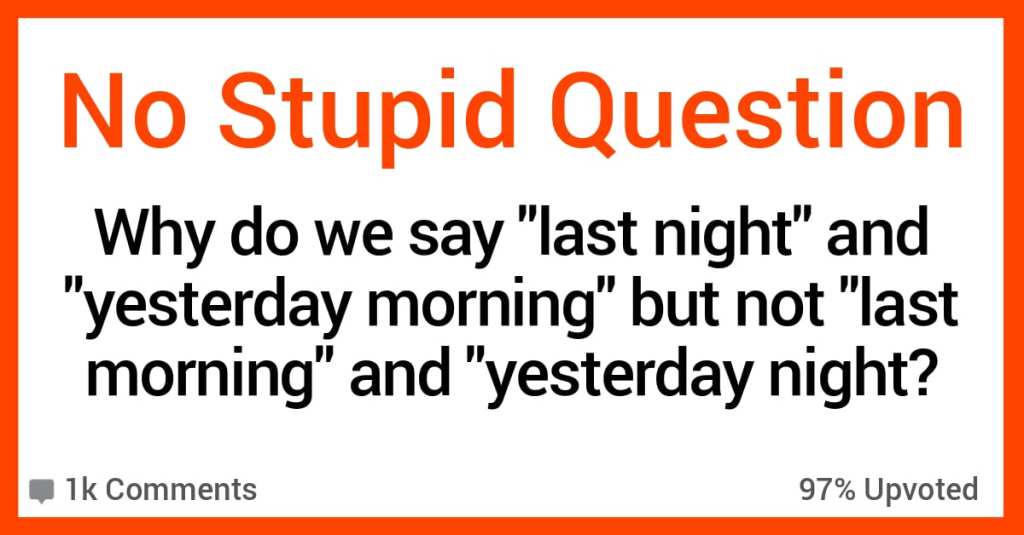No one in the world would argue that English is a rough language to learn and to speak, and even those of us who grew up speaking it often have questions about why things are the way that they are.
For instance, why do we say “last night” but not “last morning?”
Why do we say “yesterday morning” but not “yesterday night?”
Why do we say “last night,” but not “last morning,” and “yesterday morning,” but not “yesterday night?”
byu/TheBigMcTasty inNoStupidQuestions
If you’re curious, well, read on – these 13 people have some thoughts.
13. Are you time traveling.
I absolutely say Yesternight.
12. That makes sense.
Night would be the last part of the day, so you could say it any time today and it would be correct in its meaning of yesterday night.
Last morning would only be able to be said in the morning, because if you said last morning in the evening, it’d be today’s morning.
11. We like it that way.
Collocations. Basically, those words are just usually grouped together that way and anything else sounds weird.
10. To get specific.
Yesterday is a specific day you’re referencing. Last is just referencing the most recently past, which could be today.
Also, I’ve said yesterday night before. It’s not that weird.
Thinking about it, I tend to use yesterday night when speaking about yesterday night while it is currently night, but if it’s morning or day time, I’ll say last night.
9. As long as you’re consistent.
I’ve met a few Indian folks who say: “yesterday morning”, “tomorrow morning”, and “today morning”, which just sounds weird, but is perfectly consistent.
8. Some people just love to complicate things.
To add to this… yesterday night just sounds awkward. If anything, it should be yesternight.
7. It won’t work every day.
Yester-day ie the day before, therefore last night makes sense.
6. Also a rough one.
How about “this weekend?” I always feel the need to specify past or coming.
5. There’s always gotta be one.
From now on, I’m adding the following words to my vocabulary: “yesternight,” “yestermorn,” “yesterforenoon,” “yesterafternoon,” and “yesterevening.”
4. Maybe we should say it?
Yesterday night doesn’t really sound that incorrect to me??
3. We’re lazy.
“Yesterday night” I suspect isn’t common because it’s a mouthful and has the words “day” and “night” together which is confusing as you have to work out for a moment if it’s day or night you’re talking about.
We tend to use “yesterday morning” because if it’s the afternoon then “last morning” could be confused with THAT morning (as it’s technically the last morning) rather than the morning before which was “yesterday” and therefore “yesterday morning”.
2. Strictly speaking.
It’s weird, some people think it’s normal English and wouldn’t notice if someone else used it, but to others, it sounds totally foreign.
Per Wiktionary:
Last night occurs about 1,000 times more often than yesterday night in the US, UK, Canada, and Australia, Last night occurs about 100 times more often than yesterday night in Singapore, India, and South Africa.
Strictly speaking, it is grammatically correct. And it is used throughout the English speaking world, just much less than “last night”. So technically, it is correct English.Anecdotally, I think people who are either not native speakers of English, or are native speakers but grew up around people who did not speak English, are more likely to use “yesterday night”. I definitely hear white Americans use it sometimes, though.
1. It’s confusing.
When you use last morning does the last reference the morning of the same day or the morning of the last day?
Technically last should be in reference to only the morning part so as long as it is afternoon the last should 100% reference the same day. However a lot of times when talking about something that modifies days we let the time modify day as well. For instance I might say “this morning” even though it is 2 pm. I think we recognize the ambiguity naturally and instead use yesterday since that tells us what day we are talking about out right and we have this for today anyway.
Last night doesn’t have this problem however since the last night always crosses the day time frame.
I will add one other thing as an aside, yesterday will reference day + night if there isn’t a time frame but most people don’t generally picture night time as an option. Which is why I don’t think you hear yesterday night, though yesternight sounds fine but old timey.
I really loved delving into this one!
What are your thoughts? What are the language things that stump you?
Share in the comments!






